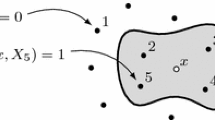Abstract
Multi-agent systems are one of many modern distributed approaches to decision, optimization and other problem solving. Among others, multi-agent systems have been often used for prediction, but those approaches require a supervisor agent for integrating the knowledge of other agents. In this paper we discuss the shortcomings of such approach and propose a switch to decentralized groups of agents with asynchronous communications. We show that this approach may obtain similar results, while avoiding the pitfalls of centralized architecture.
Access this chapter
Tax calculation will be finalised at checkout
Purchases are for personal use only
Similar content being viewed by others
References
Chaimontree, S., Atkinson, K., Coenen, F.: A multi-agent based approach to clustering: harnessing the power of agents. In: Cao, L., Bazzan, A.L.C., Symeonidis, A.L., Gorodetsky, V.I., Weiss, G., Yu, P.S. (eds.) ADMI 2011. LNCS, vol. 7103, pp. 16–29. Springer, Heidelberg (2012)
Dong, W., Lepri, B., Pianesi, F., Pentland, A.: Modeling functional roles dynamics in small group interactions. IEEE Trans. Multimed. 15(1), 83–95 (2013)
Garcia-Herranz, M., Moro, E., Cebrian, M., Christakis, N.A., Fowler, J.H.: Using friends as sensors to detect global-scale contagious outbreaks. PloS one 9(4), e92413 (2014)
Hale, M.T., Nedic, A., Egerstedt, M.: Cloud-based centralized/decentralized multi-agent optimization with communication delays. arXiv preprint. (2015). arxiv:1508.06230
Hernes, M., Sobieska-Karpiska, J.: Application of the consensus method in a multiagent financial decision support system. Inf. Syst. e-Bus. Manage., Springer, Heidelberg (2015). doi:10.1007/s10257-015-0280-9
Korczak, J., Hernes, M., Bac, M.: Performance evaluation of decision-making agents in the multi-agent system. In: Proceedings of Federated Conference Computer Science and Information Systems (FedCSIS), Warszawa, pp. 1177–1184 (2014)
Iscaro, G., Nakamiti, G.: A supervisor agent for urban traffic monitoring. In: IEEE International Multi-Disciplinary Conference on Cognitive Methods in Situation Awareness and Decision Support (CogSIMA), pp. 167–170. IEEE (2013)
JADE, Java Agent Development Framework. http://jade.tilab.com/
Jiang, A., Marcolino, L.S., Procaccia, A.D., Sandholm, T., Shah, N., Tambe, M.: Diverse randomized agents vote to win. In: Advances in Neural Information Processing Systems, pp. 2573–2581 (2014)
Maleszka, M., Nguyen, N.T., Urbanek, A., Wawrzak-Chodaczek, M.: Building educational and marketing models of diffusion in knowledge and opinion transmission. In: Hwang, D., Jung, J.J., Nguyen, N.-T. (eds.) ICCCI 2014. LNCS, vol. 8733, pp. 164–174. Springer, Heidelberg (2014)
Mercik, J., Tolkacz, O., Wojciechowska, J., Maleszka, M.: Wykorzystanie integracji wiedzy do zwiekszenia efektywnosci prognozowania w warunkach niepewnosci. In: Porebska-Miac T. (Ed.) Systemy Wspomagania Organizacji , Wydawnictwo Uniwersytetu Ekonomicznego w Katowicach, Katowice 2015 (2015)
De Montjoye, Y.-A., Stopczynski, A., Shmueli, E., Pentland, A., Lehmann, S.: The Strength of the Strongest Ties in Collaborative Problem Solving. Scientific reports 4, Nature Publishing Group (2014)
Nagata, T., Sasaki, H.: A multi-agent approach to power system restoration. IEEE Trans. Power Syst. 17(2), 457–462 (2002)
Nakamiti, G., da Silva, V.E., Ventura, J.H., da Silva, S.A.: Urban traffic control and monitoring – an approach for the brazilian intelligent cities project. In: Wang, Y., Li, T. (eds.) Practical Applications of Intelligent Systems. AISC, vol. 124, pp. 543–551. Springer, Heidelberg (2011)
Nguyen, N.T.: Advanced Methods for Inconsistent Knowledge Management. Advanced Information and Knowledge Processing. Springer, London (2007)
Peterson, C.K., Newman, A.J., Spall, J.C.: Simulation-based examination of the limits of performance for decentralized multi-agent surveillance and tracking of undersea targets. In: SPIE Defense+ Security, pp. 90910F–90910F. International Society for Optics and Photonics (2014)
Sun, L., Axhausen, K.W., Lee, D.H., Cebrian, M.: Efficient detection of contagious outbreaks in massive metropolitan encounter networks. Scientific reports, 4, Nature Publishing Group (2014)
Xuan, P., Lesser, V.: Multi-agent policies: from centralized ones to decentralized ones. In: Proceedings of the First International Joint Conference on Autonomous Agents and Multiagent Systems: part 3, pp. 1098–1105. ACM (2002)
Acknowledgment
This research was co-financed by Polish Ministry of Science and Higher Education grant.
Author information
Authors and Affiliations
Corresponding author
Editor information
Editors and Affiliations
Rights and permissions
Copyright information
© 2016 Springer-Verlag Berlin Heidelberg
About this paper
Cite this paper
Maleszka, M. (2016). Knowledge in Asynchronous Social Group Communication. In: Nguyen, N.T., Trawiński, B., Fujita, H., Hong, TP. (eds) Intelligent Information and Database Systems. ACIIDS 2016. Lecture Notes in Computer Science(), vol 9621. Springer, Berlin, Heidelberg. https://doi.org/10.1007/978-3-662-49381-6_35
Download citation
DOI: https://doi.org/10.1007/978-3-662-49381-6_35
Publisher Name: Springer, Berlin, Heidelberg
Print ISBN: 978-3-662-49380-9
Online ISBN: 978-3-662-49381-6
eBook Packages: Computer ScienceComputer Science (R0)




